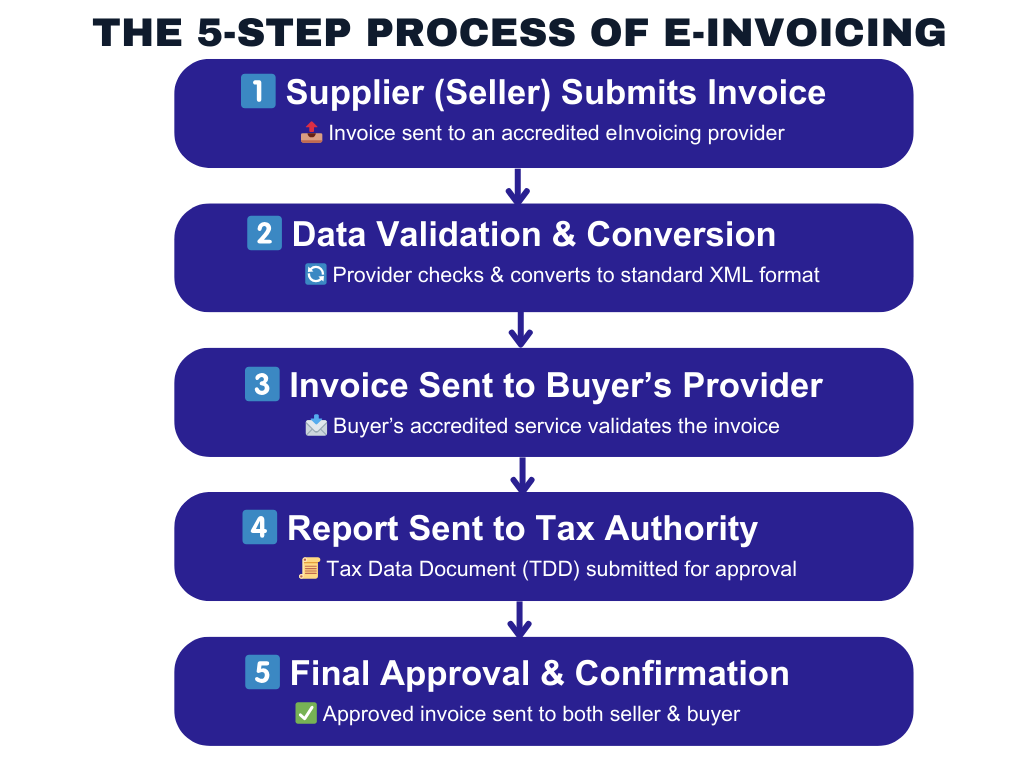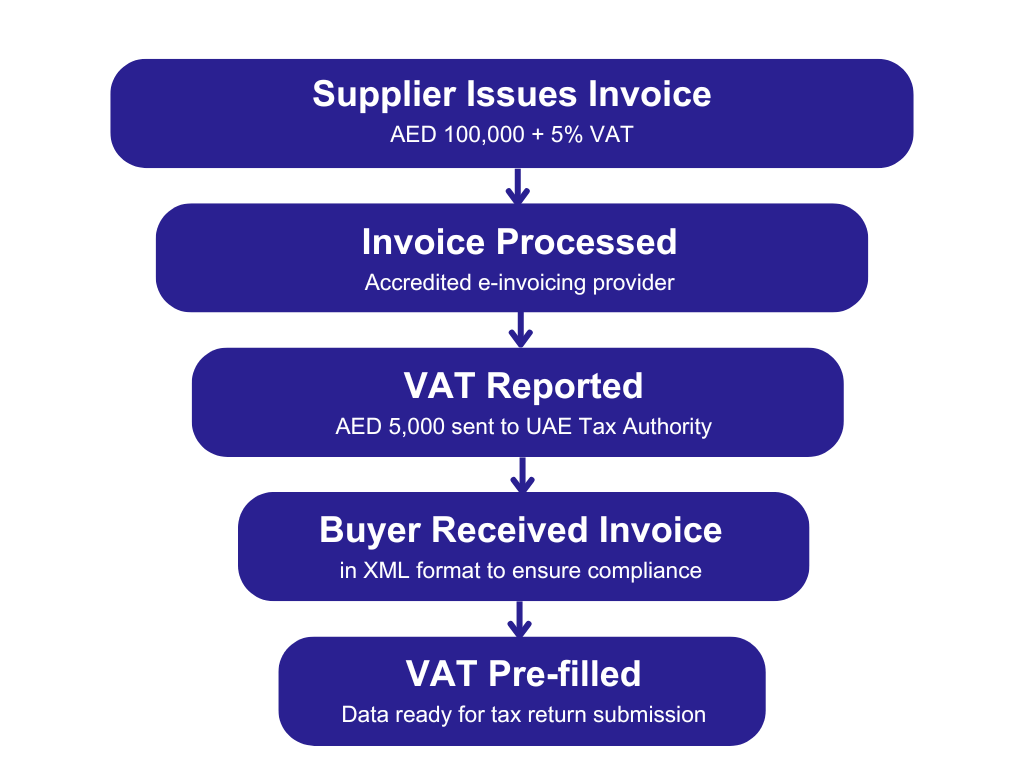Understanding UAE's e-Invoicing Framework: What It Means for Your Business
The intention to introduce eInvoicing in 2026 reaffirms the UAE’s ambition to innovate at pace and digitalize the economy. Businesses and government entities are set to benefit from a new approach to invoicing where simplification, standardization, and automation will help near real-time exchange of invoices and facilitate seamless tax reporting to the UAE Federal Tax Authority.
What is UAE e-Invoicing?
The UAE Ministry of Finance has introduced an eInvoicing
framework as part of its broader digital transformation strategy. This move
aligns with global trends and enhances compliance with VAT regulations,
improves transparency, and optimizes business operations.
The system follows a Decentralized Continuous Transaction
Control and Exchange (DCTCE) model, which means that electronic invoices
are standardized and reported in real time to ensure tax compliance and
fraud prevention.
Key
Objectives of the UAE e-Invoicing Program:
- Tax
Compliance: Reducing tax fraud and
improving VAT reporting accuracy.
- Operational
Efficiency: Minimizing manual
intervention and automating invoicing.
- Sustainability: Reducing paper invoices and streamlining reporting.
- Business
Transparency: Creating a standardized
invoicing system.
How Does the e-Invoicing Process Work?

This automated process ensures compliance, reduces errors,
and enhances auditability.
Practical
Example with Numbers
Scenario: A
Dubai-based Company Selling Services to a Local Client

How
eInvoicing Benefits Businesses:
- Faster
invoice processing → Reduced delays in payments.
- Automated
VAT compliance → No manual errors in tax
reporting.
- Cost
savings → Reduction in administrative
work and paperwork.
- Real-time
transaction tracking → Improved financial reporting
and audits.
Common
Questions (Q&A Format)
Common
Questions (Q&A Format)
1. Who is
required to comply with eInvoicing in the UAE?
All businesses operating in the UAE, regardless of
VAT registration status, must comply with the eInvoicing framework.
Accordion Description
2. What
types of invoices are covered?
The UAE eInvoicing system includes:
- Standard
tax invoices
- Zero-rated
and reverse charge invoices
- Tax
credit notes
- Invoices
for Free Zone entities and eCommerce businesses
Accordion Description
3. Do businesses
need special software?
Yes, businesses must use accredited eInvoicing software
to generate and submit compliant invoices in XML format.
4. When will
the eInvoicing system be mandatory?
The UAE government will roll out the system in phases,
with deadlines yet to be officially announced.
5. What are
the penalties for non-compliance?
Penalties may include fines and restrictions on
non-compliant businesses. The framework encourages early adoption to
avoid penalties.
How Fastlane
Consultancy Can Help
Navigating the shift to eInvoicing can be complex. Fastlane
Consultancy provides:
- End-to-end
eInvoicing compliance support
- Integration
with accredited eInvoicing software
- VAT
and tax advisory services
- Training
for finance teams on new invoicing processes
By partnering with Fastlane, businesses can ensure seamless
compliance, avoid penalties, and optimize operations.
Conclusion:
Act Now to Stay Compliant
The UAE's eInvoicing framework is a game changer for
businesses, ensuring compliance, efficiency, and transparency. By adopting
eInvoicing early, businesses can reduce costs, improve reporting accuracy,
and streamline operations.
Need help with eInvoicing compliance? Contact Fastlane
Consultancy today!
1. Limited Liability Company (LLC)
Overview: An LLC is the most common form of business entity for foreign investors in the UAE. It requires a minimum of two and a maximum of 50 shareholders, with the liability of shareholders limited to their shares in the company’s capital.
Key Features:
Local Sponsorship: Traditionally, an LLC required 51% ownership by a UAE national, but recent changes allow for 100% foreign ownership in certain sectors.
Capital Requirements: No minimum capital requirement in many Emirates, though some free zones may have specific requirements.
Flexibility: Suitable for a wide range of commercial activities except for insurance, banking, and investment.
Advantages:
Flexibility in business operations.
Limited liability protects shareholders’ personal assets.
Capability to open branches or subsidiaries.
2. Free Zone Company
Overview: Free zones are designated areas offering specific economic advantages. Businesses in these zones can be 100% foreign-owned, and they benefit from tax exemptions and simplified import/export procedures.
Types of Free Zone Entities:
Free Zone Establishment (FZE): Single shareholder.
Free Zone Company (FZC): Multiple shareholders.
Branch of a Foreign Company: No share capital required.
Key Features:
Tax Benefits: 0% corporate and personal tax for a set number of years.
Ownership: 100% foreign ownership.
Repatriation: Full repatriation of profits and capital.
Advantages:
Ideal for export-oriented businesses.
Simplified business setup and operational processes.
Clusters of similar businesses encourage networking and growth.
3. Branch Office
Overview: A branch office is an extension of a foreign parent company that can conduct business in the UAE but does not have a separate legal identity from the parent company.
Key Features:
Scope: Can carry out activities similar to those of the parent company, excluding manufacturing.
Ownership: Requires a local service agent but does not require a local sponsor or partner.
Liability: Liabilities extend to the parent company.
Advantages:
Direct representation of the parent company.
Beneficial for companies seeking to expand their market presence in the UAE.
4. Representative Office
Overview: A representative office can be set up to promote the parent company’s products or services and facilitate contracts but cannot engage in commercial activities or generate profit.
Key Features:
Scope: Limited to marketing and promoting the parent company.
Ownership: Requires a local service agent.
Liability: Limited as it does not engage in profit-generating activities.
Advantages:
Cost-effective way to establish a presence in the UAE.
Facilitates market research and business development.
5. Public Joint Stock Company (PJSC)
Overview: A PJSC is suitable for large enterprises and requires at least 10 founders who subscribe to shares through a public offering.
Key Features:
Capital Requirements: Minimum share capital of AED 10 million.
Public Subscription: Shares can be publicly traded on the stock market.
Management: Managed by a board of directors.
Advantages:
Access to capital through public markets.
Enhanced corporate visibility and credibility.
6. Private Joint Stock Company (PrJSC)
Overview: Similar to a PJSC but does not offer shares to the public. It is ideal for larger private ventures and requires at least three shareholders.
Key Features:
Capital Requirements: Minimum share capital of AED 2 million.
Ownership: Shares are privately held and not publicly traded.
Management: Managed by a board of directors.
Advantages:
Suitable for large private investments.
Greater control over company management and operations.
Conclusion
Choosing the right legal structure is crucial for the success of a business in the UAE. Each structure offers distinct advantages, regulatory requirements, and suitability depending on the business’s nature and goals. Understanding these options helps entrepreneurs and investors make informed decisions, ensuring their business operates effectively and complies with UAE regulations.
For more detailed information and guidance on setting up a business in the UAE, consult the UAE Ministry of Economy and specific free zone authorities such as Dubai Multi Commodities Centre (DMCC) or Jebel Ali Free Zone (JAFZA).




